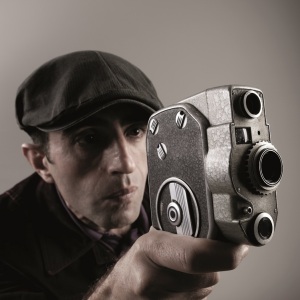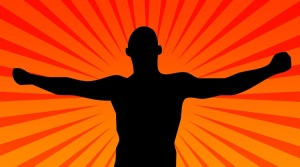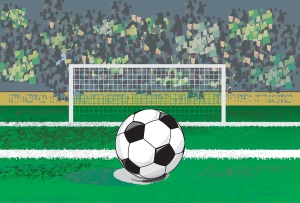In 2006 I travelled to Germany for the FIFA World Cup. During my travels I wrote weekly articles for the Matamata Chronicle. Here is the complete series (which I chose to present as one long post because I know how annoying it is to have to click links more than you need to). I continued this process for South Africa 2010 and I’ll post that series here too, just not right now.
PART 1 (published June 6)
Football is a funny game. That’s probably the most famous cliche in a sport full of famous cliches.
For me that applies double. Just a day after I left New Zealand for Germany, and my first FIFA World Cup, Matamata Swifts, the club I have had so much involvement with over so many years, played our biggest match in years. On Queen’s Birthday Monday – yesterday – the Swifts played Tauranga City United in the 2nd round of the Chatham Cup, a competition which is New Zealand’s version of the English FA Cup.
The game is a true David versus Goliath contest. In 2002, Tauranga made it to the Chatham Cup final, while the 2nd round is the furthest Matamata has ever progressed. Deadlines, the bane of writers the world over, mean I can’t share the result with you today as this article was written two days before the match. But spare a small thought for me as I will have nervously watched the clock as kick-off nears and then waited for the text message that will let me know the result. I’ll be somewhere between Hong Kong and London when the game is being played, my body clock already well and truly screwed up and playing tricks with my sleep-deprived head. So hopefully the short message I receive will help relieve the agony that is long-haul international travel.
Rather courageously or perhaps foolishly – you decide – I have promised the Chronicle team that I’ll supply a weekly report from the centre of the footballing universe aka the FIFA World Cup in Germany. This is, possibly, my misguided attempt to bring a slice of the world’s greatest sporting extravaganza to New Zealand’s rugby heartland. I reckon it’s worth a shot!
Part of this process involves the obligatory photo, which you’ll probably find somewhere on this page (not available on the website. Damn shame…). I know, I know, I’ve got a good face for radio, so hopefully my words over the next few weeks will paint a better picture for you. I will try to share the excitement, passion and plain good fun that only an event of this magnitude can bring. Think the rugby world cup multiplied by ten and you will have some idea of just how big this whole thing will be.
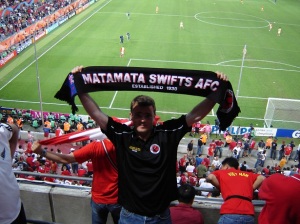
Swifts scarf – token stadium shot
We, (my wife Jean and I), have been planning this trip for ages. We are lucky enough to have secured tickets to three matches, which is bloody good going when you take into account how hard they are to come by. On June 20 we will be in Hannover to watch Poland play Costa Rica. This match will serve as a nice little warm up for the big one in Hamburg two days later. Italy versus the Czech Republic, potentially the most crucial game in what promises to be the tightest group of the whole tournament. As a warm down we will be in Cologne on June 26 to watch one of the round of 16 games.
Keep your eyes open for a Matamata Swifts scarf at these games. We’ll do our best to get on TV. By the time you read this, Matamata will have played Tauranga and New Zealand will have played Brazil (!). I’ll be in Frankfurt feeling, looking, and probably smelling, like a zombie. Not a pretty thought but I’m sure it’s something I’ll manage to deal with considering what lies ahead over the next five weeks.
PART 2 (published June 13)
The madness has begun. After four years of waiting the world’s largest ever sporting event has finally kicked off.
And guess what? I didn’t get to see the opening match. I was on a bus somewhere between Naples and Rome when it was played. I guess Jean must have organised this part of our holiday. Thankfully we did manage to see the goals on CNN when we finally made it to the hotel. A 4-2 victory to the host nation and some spectacular goals hopefully is a sign of things to come.
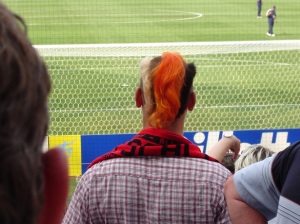
The Germans were ready.
For us this week has been all about getting to Europe and enjoying the summer. We spent a night at an airport hotel in Frankfurt, Germany, before flying to the crazy country of Italy. Our hotel shuttle driver in Frankfurt was fed up with all the World Cup hype. It’s everywhere. I think he just wanted the tournament to get underway. He wasn’t too confident about his country’s chances of winning, but he did say he’d like to see a Germany versus Portugal final. Now that would be a contrast in styles if ever you saw one.
Italy is crazy in a good way. It’s our first time here and it would be safe to say the prevailing thought, at least with us, has been, ‘What World Cup?’ Such has been the quality of our holiday so far. Fantastic weather, great scenery and some of the best food you’re ever likely to eat. But you don’t want to hear about that.
As there hasn’t been too much football yet, I thought I’d take a bit of a punt and make a few suggestions about where you should place you hard earned cash for this World Cup (assuming you are betting people). After completing a highly unscientific process that included much guessing and speculation, my early pick is for a Brazil versus Holland final. My mate Pete Vossen will be pleased to hear that!
The Brazilians have to be favourites because they have the best footballers in the world. They are the All Blacks of world football except they don’t choke on the big occasions. The Dutch have an exciting young side coached by the legendary Marco Van Basten. Because of this and the fact they are so close to home they are my dark horses. Other teams to look out for are Argentina, England, Germany and Italy.
After having spent some time in Italy I have a secret little hope they will do well. We had lunch in Sorrento, near Naples, on Thursday, which consisted mainly of pizza and beer. The beer, Peroni, had a picture of the 1982 World Cup winning Italian side on the label and that brought some big memories flooding back. 1982 was my first World Cup, naturally enough, because that year was the one and only time New Zealand was involved. It was also the last time the Azzuri won and they did it in the sort of style you would only expect from the Italians. I still remember Marco Tardelli’s length of the pitch run after scoring a goal in the final against West Germany. Was that really 24 years ago?
We have another week in Italy before arriving in Munich next Friday. I can’t wait!
PART 3 (published June 20)
Munich, Germany – football heaven. Well, it’s probably about as close as I’m ever going to get!
Jean and I arrived back in Germany today (Friday) after eleven days in Italy and it would be fair to say we found a country that has gone absolutely mad for football. We’ve only been in Munich for a few hours but we’ve seen the World Cup plastered everywhere. You kind of get the feeling the Germans are going to make sure this tournament is a success.
We are in Munich for the Australia versus Brazil game, which is being played on Sunday. We don’t have tickets so we’ll probably watch the match, along with 69,998 others, on one of the jumbo screens at Munich’s Olympic Park. I’m sure the atmosphere will be almost as good.
We’ve already run into one Australian guy who paid 150 Euros for a ticket to their game against Japan. He’s going to try to pick up something similar on the street tomorrow. Somehow I don’t fancy his chances.
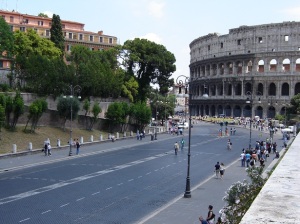
We watched a game of football near this.
Amongst all our Italian monument visiting and culture sampling during the last week we have managed to catch at least one game a day. We experienced the England versus Paraguay game in a small bar only a block away from the Colosseum in Rome. A small quiet bar. There were only three other customers, plus the owner, there. Not conducive to producing a great atmosphere, but it was a good afternoon nonetheless.
We were in Florence for two nights earlier in the week that coincided with the tournament debuts of a couple of the big guns, Italy and Brazil. I watched both games on the big screen in the hotel bar with an Italian-American guy from Brooklyn who was part of our tour group. He was as unimpressed as I was with both teams. Although both won they were far from convincing.
Italy were nervous against a solid, but unthreatening, Ghana. They should have more than the two goals they managed, but you always had the feeling the game wasn’t safe until they got their second. Brazil just looked flat (and, in Ronaldo’s case, fat). Maybe they peaked when they beat the All Whites 4-0. Or perhaps, more realistically, they just did what needed to be done.
We did our best to find an authentic local bar to watch the Italian game but couldn’t find anything. Granted, it was a Monday evening, but I thought Matamata was the only place in the world that closed up early in the week. Maybe we just looked in the wrong places.
The tournament really kicks off for us this week. We’re going to games in Hannover, on Tuesday, and Hamburg, on Thursday. The game in Hamburg will be some occasion because it is between Italy and the Czech Republic and should decide who wins their group. So I’ll have plenty of stuff to talk about next week.
Also, the beer here in Germany is cheaper – and better – than in Italy. That, as much as anything, leads me to believe the next couple of weeks are going to be a lot of fun.
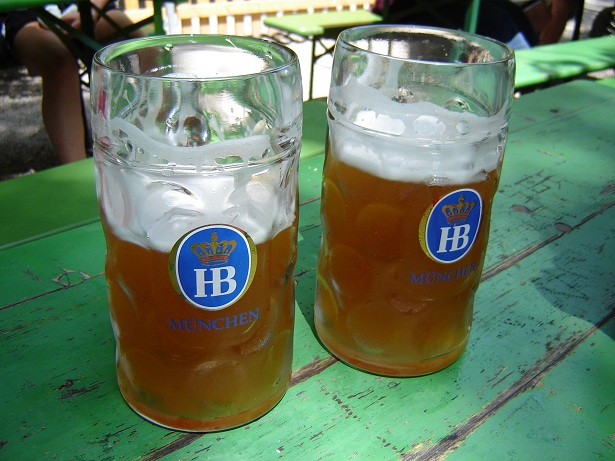
Mmmm. Beer.
PART 4 (published June 27)
After more than two weeks on the road we finally got to see some live football. It was worth the wait, mainly for the atmosphere and the chance to visit a couple of truly breath-taking stadiums.
Last weekend we spent in Munich and were blown away by the friendliness of the city. Ten days in Italy had left us slightly on edge so it was great to be able to really relax. All weekend the main square, the Marienplatz, was full of Aussie and Brazil fans, along with people from many other nations. On Sunday we took a trip out to the stadium for an hour or so before making it back into town in time to watch the game.
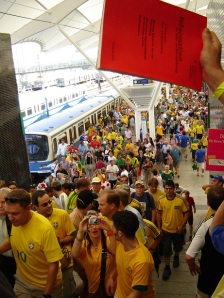
On the way to the game.
The area around the ground was choked with people, with more than a few still looking for match tickets. It was a fun, unthreatening environment, with no trouble in sight.
The Germans have made a deliberate choice to allow fans from all countries to mix and, so far, this has paid off spectacularly. The police do, of course, have a large and visible presence, but they always seem to be in the background, secure in the knowledge that they know that you know they are there.
After Munich we caught the train up to Hannover in the northern part of the country. Hannover is a unique city. Clean, modern and vibrant, while still containing enough historic points of interest to keep any tourist busy, it also has some of the weirdest looking people you are ever likely to come across. It wasn’t just one or two, they were everywhere. I felt right at home.
We were in Hannover to watch Poland play Costa Rica. It wasn’t a remarkable match, won 2-1 by the Poles, but that didn’t matter. We had arrived at the World Cup and were finally a part of it. There must have been more than 30,000 Polish fans in the 43,000 seat stadium and they made a lot of noise. Every one of them had a football scarf and it looked like a red and white wave circling the ground when they started swinging them ’round their heads. Our single black and white Matamata Swifts scarf looked a little out of place.
Two days later we could be found in Hamburg for what was probably the single biggest game of the group phase. Neither Italy nor the Czech Republic, two of the best teams in the world, had secured passage through to the second round and they both needed to win. I felt a little guilty walking into the stadium past hundreds of ticketless fans from both countries and did wonder (for maybe a few seconds) how much money we could have made if we had sold our tickets. A conservative estimate would have been something in the region of 250 Euros (NZ$500) a piece.
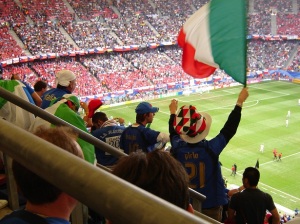
Italia, Italia!
Of course, we held on to our tickets and experienced one of the best football occasions you’re ever likely to experience. The game itself was almost an afterthought, though. While the quality of the football was better than the Poland game, it was the stuff that happened off the pitch that grabbed the attention. The banks of fans in red or blue, all chanting, singing and desperate for their team to win, created the type environment you just don’t get for any other sport.
As a neutral, it became quite obvious that Italy would win, particularly after they took an early lead. It was fun, however, to watch the range of emotions their fans, many of who were seated near us, went through before the final whistle. Anger, hope, despair and, finally, elation. I think it’s called passion. Sporting events just aren’t like this back home.
Italy won 2-0 and that meant the Czechs, currently ranked number two in the world, were out. African nation, Ghana, will join the Azzuri in the next round instead.
We were made to feel a little inadequate during this game. Seated in a section of the ground with a handful of other Kiwis we got chatting with a guy from Wellington and he told us he and his mate had managed to secure tickets to eleven games at this World Cup. Eleven games!! Our three match allocation pales in comparison.
PART 5 (published July 4)
I’m in a hotel room in Amsterdam and it’s a Friday night. I should really be out having a look at some of the weird and wonderful things this crazy city has to offer, but I’m sitting here typing the latest instalment of what has hopefully become a compelling serial. I hope you appreciate the sacrifice I’m making.
In my defence, it’s late and we have an early flight tomorrow.
Actually, I’m watching the second half of the Italy v Ukraine quarter final, a game the Italians are running away with. This is a surprise, in a way, because the Italians have not looked good so far in this tournament. I mean, it took a pretty rough penalty in the 5th minute of injury time to get them past the Aussies. Maybe they have decided to come good at the right time.
We saw the first quarter final, between Germany and Argentina, in a bar earlier today. Argentina looked the better team but the Germans managed to level the game at 1-1 late on and take the game to penalties, and everyone knows what happens when the Germans are in a penalty shoot-out. Their passage to the semi-finals will be good for the tournament because it will keep the fun, euphoric, celebratory atmosphere going for a few more days.
Germany is certainly the place to be at the moment. We were in Cologne last weekend and found out just how much this whole thing means to the people. The streets were dead while they played Sweden in their first knock-out game, but filled up immediately after their victory. There were happy Germans all over the place. Car horns blaring, flags waving and broad smiles everywhere. I could just imagine how the place will go off if they actually manage to win the whole thing.
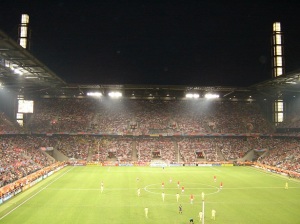
Great stadium. Not so great game.
Cologne was the venue of the final World Cup game we had tickets for. Another fantastic stadium, but we had the misfortune of sitting down to watch two hours of goal-less football as Switzerland and the Ukraine played out the single worst match of this competition. The football really was tedious. Boring. It was almost as bad as watching a game of rugby.
The saving grace was that the penalty shoot-out took place in the goal directly below our seats. So we, at least, got some good photos.
We also had it brought home to us just how global the World Cup is. We had two guys from Vietnam sitting in front of us, a handful of Caymen Islanders to our right, a couple of Kiwis to our left and a bunch of Irish blokes behind us. Not to mention all the Swiss, Ukranians, Germans, French, English and countless other nationalities all around. I’ve been asked to keep this brief this week so I’ll wrap things up here. I promise to let you know more in my final instalment next week.
PART 6 (published July 11)
By the time you read this you’ll know who has won the World Cup. I’m hoping for an Italian victory, but I have a sneaking suspicion the match will have ended 0-0 with the French victorious on penalties. So far, however, my predictions for this tournament have been regularly lacking in accuracy. Remember, in an earlier article I stated the final would probably be between Brazil and the Netherlands. Not long after that I emailed a mate and told him that Italy would not win this tournament. So, what do I know.
I’m writing this on Sunday morning having just watched Germany beat Portugal 3-1 in the 3rd place play-off thanks to some stunning goals. This was the right result and reward for all they, along with the German people, have given this tournament. Our perfectly organised trip home allowed us to arrive back in the country on Friday, just in time to rest up for the final two matches and having watched the French mercifully beat the Portuguese in the second semi-final. Portugal, despite having a host of talented players in their squad, would not have made too many friends. Their theatrics, annoying at first, then plain boring, turned many people against them. It was satisfying to see that style of play prove to be unfruitful.
If I have one regret from our trip it is that I didn’t have a team to genuinely support. I got jealous watching the Aussies, Brazilians, Poles, Italians and others go through all the emotions involved with having a stake in team competing in such an event. I desperately wish that sometime during my lifetime New Zealand manage to make it to the World Cup so that I get to have those feelings too. Moreover, it is something that, as a proud kiwi, I hope New Zealand and New Zealanders also get to experience. You can only hope. [Little did we know then what was to happen only four years later.]
Here are a few of my highlights and lowlights from the last month.
Highlights:

Even the horses got into it.
1. Germany. The whole country has been in party mode for a month. Millions of fans from Europe and around the world combined to make this a true tournament for the people. I don’t think the average kiwi would appreciate just how impressive the atmosphere was, both inside and, especially, outside the stadiums. In short, Germany went off.
2. The stadiums. Eden Park and Jade Stadium have nothing on the twelve impressive venues used for this World Cup. Stunning locations, unique architecture and genuine, unmanufactured atmosphere. Light years ahead of what we have for big sporting events in this country. Awe inspiring.
Lowlights:
1. The diving. Oh how I wish this blight on the game would be wiped out. Players should take more responsibility, but the best way to stop it would be for FIFA to review each match on video after it’s finished and award retrospective yellow cards. Teams would soon change their tactics if they know they don’t just have a single referee to con.
2. Coming home. I’ve only been back in the country a couple of days and I’ve already read a couple of newspaper articles that make me despair. The writers have picked up on a couple of themes (the diving and the defensive nature of some of the knock-out games) in an attempt to justify why they think football is crap and rugby rules. It’s not and it doesn’t and I just wish that one day our sporting media would get this chip off their collective shoulders.
And so we look forward to South Africa in 2010. The Africans have a lot to live up to, but I am sure they’ll give it their best shot. I’m already making plans to be there!
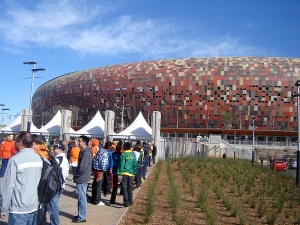





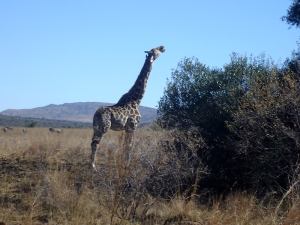

 I’ve stayed at a couple of hotels in Lyon and would recommend both. The
I’ve stayed at a couple of hotels in Lyon and would recommend both. The  Only metres from the theatre is the
Only metres from the theatre is the 








